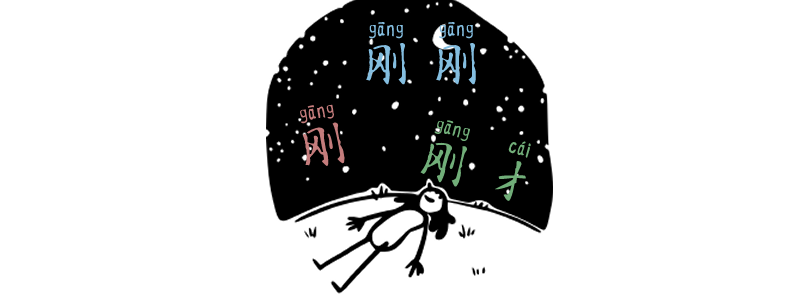Grammar Point:
The words “刚 gāng”, “刚刚 gānggāng” and “刚才 gāngcái” are used to indicate an action that has just happened a short while ago. However, there are some subtle differences in their meanings and usage:
刚 gāng
It is an adverb that can only be used before a verb or adjctive and after a subject. It emphasizes that an action has just happened or that something is just about to happen, and it is the longest period of time among the three “just” expressions.
The funny thing is “刚 gāng” can be used to indicate an event that occurred in the past, present, or even future. Therefore, the concept is more focused on the time frame, specifically a short period of time, rather than the tense.
- Past:
他昨天剛到北京他昨天刚到北京
He just arrived in Beijing yesterday.
- Present:
我剛出門我刚出门
I just went out.
- Future:
你剛到學校的時候一定要跟老師打招呼你刚到学校的时候一定要跟老师打招呼
You must say hello to the teacher when you just (first) arrive at school.
你剛去見誰?你刚去见谁?
Who did you just go see?
天剛晴天刚晴
The weather just cleared up.
我剛買了新手機我刚买了新手机
I just bought a new cellphone.
她的狗剛死,現在她沒心情去夜店她的狗刚死,现在她没心情去夜店
Her dog just died, so she’s not in the mood to go to the nightclub now.
他剛走了三天他刚走了三天
He left only three days ago.
Common Mistakes
剛我在咖啡店買咖啡刚我在咖啡店买咖啡 ❌
I bought coffee at the cafe just now.
(An adverb need to be placed after the subject.)
剛的咖啡加了糖嗎?刚的咖啡加了糖吗? ❌
The coffee we had earlier had sugar in it?
(An adverb can not place in front of 的 de)
我剛沒喝咖啡我刚没喝咖啡 ❌
I didn’t drink coffee just now.
(There is no negation for 剛 gāng in Mandarin Chinese. Buuut some Taiwanese do say it.😅)
我剛吃飽了我刚吃饱了 ❌
I just finished eating.
(Since 刚 gāng is used to describe an action that has just happened in a short period of time, its meaning is in contrast to the particle 了2 le, which indicates a change of state. Therefore, it is not necessary to use 了2 le with 刚 gāng.)
刚才 gāngcái
It is a time word (noun) that can be placed either before or after the subject. 刚才 gāngcái refers to something that happened a very short time ago, typically within the last few minutes or seconds, so the time elapsed is relatively shorter than 刚 gāng. Since it is a time word (noun), do not place it before an adjective.
剛才有你的電話,可是你不在刚才有你的电话,可是你不在
I had a call from you just now, but you weren’t there.
我剛才吃飽了我刚才吃饱了
I just finished eating.
我剛才買了冰淇淋,快來吃!我刚才买了冰激淋,快来吃!
I bought ice cream just now, come and have some!
剛才你去哪裡了?刚才你去哪儿了?
Where did you go just now?
剛才的咖啡加了糖嗎?刚才的咖啡加了糖吗?
The coffee we had earlier had sugar in it?
你剛才為什麼不說?你刚才为什么不说?
Why didn’t you say anything in a moment ago?
我剛才沒喝咖啡我刚才没喝咖啡
I didn’t drink coffee just now.
Common Mistakes
天剛才晴天刚才晴 ❌
The weather just cleared up.
(A noun can not modify an adjective)
他剛才走了三天他刚才走了三天 ❌
He left only three days ago.
(剛才/刚才 gāngcái can not be followed by the duration of time.)
刚刚 gānggāng
Headache right? The good news is 刚刚 gānggāng can be used to express both 刚 gāng and 刚才gāngcái. In case if you don’t know whether to use 刚 gāng or 刚才 gāngcái., you can always use 刚刚 gānggāng instead.
他剛剛決定放棄學中文了他刚刚决定放弃学中文了
He just decided to give up learning Chinese.
你不是剛剛到中國,為什麼到現在一個朋友也沒有你不是刚刚到中国,为什么到现在一个朋友也没有
You didn’t just arrive in China. Why haven’t you made any friends yet?
你剛剛說的話有點過分你刚刚说的话有点儿过分
What you just said was a bit cross the line.
FYI
过分 guòfèn is a Chinese slang term that means “excessive” or “over the top.” It is often used to describe someone’s behavior, speech, or actions that are beyond what is considered reasonable or appropriate. For example, if someone says something that is too harsh or critical, another person might say “你的话有点过分 nǐde huà yǒudiǎn guòfèn” meaning “what you said was a bit excessive.” The term 过分 guòfèn can also be used to describe something that is too much or too extreme, such as a price that is too high or an action that is too risky.


